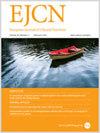肥胖症患者 PGC-1α、PPAR-α 和 UCP1 基因的表达、代谢和人体测量因素对丁酸钠补充剂的反应:一项三盲随机安慰剂对照临床试验。
IF 3.6
3区 医学
Q2 NUTRITION & DIETETICS
引用次数: 0
摘要
目的:越来越多的证据表明,肠道代谢物在肥胖的病因中起着一定的作用。本研究旨在探讨丁酸钠(NaB)补充剂对肥胖症患者过氧化物酶体增殖激活受体(PPAR)γ辅助激活剂-1α(PGC-1α)、PPAR-α和解偶联蛋白-1(UCP-1)基因表达的影响,以及对代谢参数和人体测量指数的影响:在这项三盲安慰剂对照随机临床试验中,50 名肥胖症患者被随机分配到 NaB 组(600 毫克/天)+低热量饮食组或安慰剂组+低热量饮食组,为期 8 周。该研究测量了参与者的人体测量特征、食物消耗量和饥饿感,以及血清中的代谢指标水平和外周血单核细胞(PBMCs)中 PGC-1α、PPAR-α 和 UCP-1 基因的 mRNA 表达:结果:与安慰剂相比,NaB 组的 PGC-1α 和 UCP-1 基因表达在终点时明显增加。NaB组的体重、体重指数(BMI)和腰围(WC)明显下降。在代谢因素中,NaB 能明显降低空腹血糖(FBS)(P = 0.04)和低密度脂蛋白胆固醇(LDL-C)(P = 0.038),提高高密度脂蛋白胆固醇(HDL-C)(P = 0.016)。NaB不能明显改变血清GLP-1水平:本研究揭示了单独补充 NaB 并不能对人体测量和生化因素产生明显的有益影响。只有在限制卡路里摄入的同时补充 NaB,才能影响与肥胖相关的人体测量和代谢风险变量:本研究于 2021 年 1 月 31 日在伊朗临床试验注册中心 ( https://en.irct.ir/trial/53968 ) 注册(注册号 IRCT20190303042905N2)。本文章由计算机程序翻译,如有差异,请以英文原文为准。

Expression of PGC-1α, PPAR-α and UCP1 genes, metabolic and anthropometric factors in response to sodium butyrate supplementation in patients with obesity: a triple-blind, randomized placebo-controlled clinical trial
There is increasing evidence that gut metabolites have a role in the etiology of obesity. This study aimed to investigate the effects of sodium butyrate (NaB) supplementation on the expression of peroxisome proliferator-activated receptor (PPAR) gamma coactivator-1α (PGC-1α), PPAR-α, and uncoupling protein-1 (UCP-1) genes, as well as on the metabolic parameters and anthropometric indices in persons with obesity. In this triple-blind placebo-controlled randomized clinical trial, 50 individuals with obesity were randomly assigned to NaB (600 mg/day) + hypo-caloric diet or placebo group + hypo-caloric diet for 8 weeks. The study measured the participants’ anthropometric characteristics, food consumption, and feelings of hunger in addition to the serum levels of metabolic indices and the mRNA expression of the PGC-1α, PPAR-α, and UCP-1 genes in peripheral blood mononuclear cells (PBMCs). PGC-1α and UCP-1 genes expression significantly increased in NaB group compared to the placebo at the endpoint. A significant decrease in weight, BMI, and waist circumference (WC) was observed in NaB group. Among the metabolic factors, NaB significantly decreased fasting blood sugar (FBS) (P = 0.04), low-density lipoprotein cholesterol (LDL-C) (P = 0.038) and increased high-density lipoprotein cholesterol (HDL-C) (P = 0.016). NaB could not significantly change serum GLP-1 level. This study unveiled NaB supplementation alone cannot have significant beneficial effects on anthropometric, and biochemical factors. NaB could affect anthropometric and metabolic risk variables associated with obesity only when prescribed, along with calorie restriction. This study was registered in the Iranian Registry of Clinical Trials ( https://en.irct.ir/trial/53968 ) on 31 January 2021 (registry number IRCT20190303042905N2).
求助全文
通过发布文献求助,成功后即可免费获取论文全文。
去求助
来源期刊
CiteScore
10.60
自引率
2.10%
发文量
189
审稿时长
3-6 weeks
期刊介绍:
The European Journal of Clinical Nutrition (EJCN) is an international, peer-reviewed journal covering all aspects of human and clinical nutrition. The journal welcomes original research, reviews, case reports and brief communications based on clinical, metabolic and epidemiological studies that describe methodologies, mechanisms, associations and benefits of nutritional interventions for clinical disease and health promotion.
Topics of interest include but are not limited to:
Nutrition and Health (including climate and ecological aspects)
Metabolism & Metabolomics
Genomics and personalized strategies in nutrition
Nutrition during the early life cycle
Health issues and nutrition in the elderly
Phenotyping in clinical nutrition
Nutrition in acute and chronic diseases
The double burden of ''malnutrition'': Under-nutrition and Obesity
Prevention of Non Communicable Diseases (NCD)

 求助内容:
求助内容: 应助结果提醒方式:
应助结果提醒方式:


